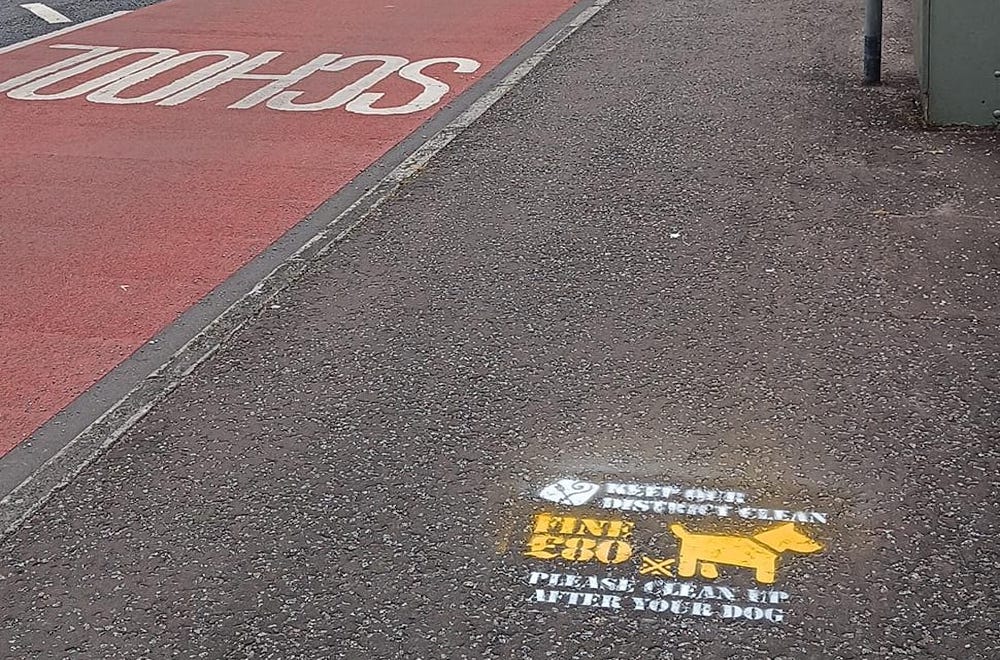
The penalty for littering or allowing your dogs to foul and failing to clean up could increase to £200.
Consideration is being given to increasing the penalty as Armagh City, Banbridge and Craigavon Borough Council aims to get even tougher on offenders.
The council’s environmental services committee look set to discuss the possibility of increasing the maximum fine for those caught not disposing of their dog’s mess to £200.
The issue was raised recently by Councillor Keith Haughian, who asked if officers had looked at increasing the fines the local authority is able to levy against those who fail to clean up after their dog.
The Lurgan councillor noted the issue is already being discussed in Lisburn and Castlereagh City Council and told the chamber that, following a spike in the amount of dog foul left in north Lurgan, he was keen to hear suggestions from officers about how the local authority could better tackle the problem.
“Members will be glad to note I am the first person in 2023 to bring up dog fouling,” he said.
“I am looking some of our team to contact me about north Lurgan. There has been a spike in dog fouling in this very densely populated area.
“Are there any plans to bring a report around the potential to increase fines in dog fouling? I believe it is being discussed at Lisburn and Castlereagh City Council to bring the maximum fine up to, or beyond, £200.
“It is not a completely straightforward matter, I know there will be implications for those who are already struggling but I was hoping for a report from officers to show if any similar plans are being considered here and also if there are any other ways they think we could improve in our approach to dog fouling.”
Council’s head of environmental health, Gillian Topping told the chamber council has been given a range of new powers, some of which will have “severe implications” for resources, and promised the chamber a report on the matter would be brought before the committee in March.
“In relation to the wider comment around increases in fines, the Northern Ireland Assembly has given council powers to increase the range for fixed penalty notices for litter and dog fouling and additional powers have also been granted for councils to address fly tipping,” she said.
“The second one will have much more severe implications for resources than the first.
“On a regional basis we will need to look at what those implications will be, because they will not be insignificant and so we will want to bring back a report on this and I would hope to have it for March.
“One of the things we will be considering are the fines and the potential for council to increase limits up to £200 for litter and dog fouling.”
Ms Topping also suggested time be set aside, either in committee or in a behind closed doors session, to discuss the ramifications of how council wishes to proceed with its administration of these new powers.
“It may be useful we spend some time looking at this, perhaps in committee or another format,” she suggested.
“I think it would be useful to have a wider discussion on this so I am happy to bring a report in March and also happy to take any other suggestions from members if you felt it might be something you wish to explore further.”
Councillor Julie Flaherty seconded Cllr Haughian’s proposal and said the borough’s dog fouling hotspots do need to be addressed.
“I think further discussion would be very useful,” said the Portadown representative.
“We did, a number of years ago, have a series of workshops that ran over the summer specifically focused on single issues. They were not terribly well attended but that is the way it goes. Maybe getting that going again would be helpful just to drill down into this.
“Cllr Haughian is quite right, there are certain hotspots where dog fouling occurs in every area of the borough and I think digging a wee bit deeper into this could be very useful.”
Bringing the discussion to a close, the committee’s Vice Chair, Councillor Catherine Nelson said it would be for the committee’s Chair, Councillor Eamon McNeil to decide if the agenda is light enough for the next meeting of the committee to “put half an hour to 45 minutes on to the end” of it for discussion of these issues or, if not, “then officers will come back to us with dates for a workshop”.



